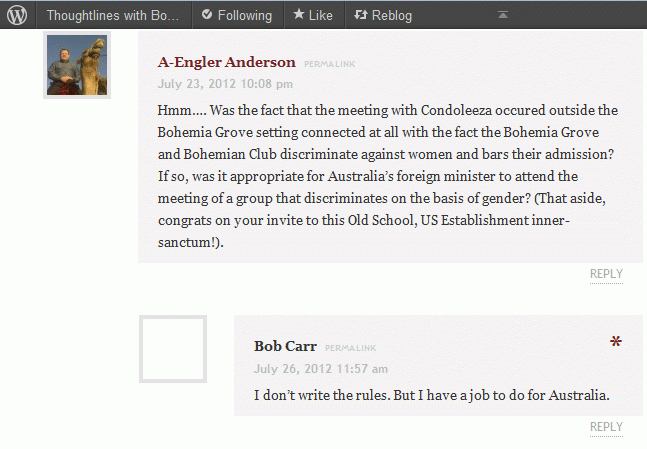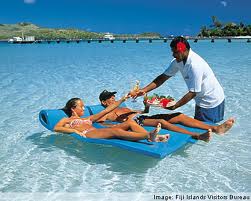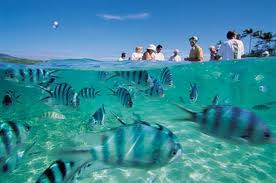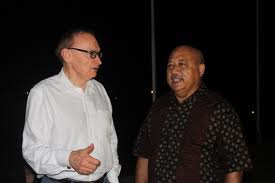Michael O’Keefe•
Last month, the Russian Foreign Minister Sergey Lavrov visited Fiji. There has been much speculation about the purpose of the visit, but this needs to be contextualised so we can make sense of its significance.
The extremes of opinion waiver between arguing that the visit heralds a major shift in the foreign affairs of the Pacific to arguing that it was simply routine diplomacy. It was neither. We need to dig deeper. We need to ask Why Fiji [the South Pacific?]? Why Now?
An overarching answer to these questions is geopolitics and strategic change. Geopolitics relates to the intersection of geography and politics. It focuses on shifts in relative power and what we are witnessing is a larger global geopolitical contest being played out in the Pacific.
To-date most discussion of regional strategic affairs has focused on China’s growing interest and whether this equates to influence. This is an issue worthy of attention but not the focus here. Suffice to say, the era of crude chequebook diplomacy whereby China and Taiwan faced off in the Pacific over diplomatic recognition is over.
China is engaging the Pacific at all levels (diplomatic, economic, cultural) and is staking its claim to being a worthy partner, especially in the context of Australian and New Zealand isolation of, and disengagement from Fiji.
Michael O’Keefe
"The political situation in Fiji may provide opportunities for engagement for the Chinese or Russians but for all powers. Fiji has strategic significance beyond its political or economic power.
This is the oft-cited ‘hub of the Pacific argument’. The ‘hub’ argument deserves close scrutiny because it is mentioned so regularly and often without explanation.
The point is that historical trends have been based on geography and have left Fiji at the centre of diplomatic, economic and educational interaction and cooperation in the region."
China’s growing interests in the region have not gone unnoticed in Washington and Canberra (and Moscow).
US President Barack Obama’s recent comments about the renewed US role in the Pacific century have highlighted the potential for strategic competition in the region the likes of which have not been seen since the end of the Cold War in the late 1980s.
Back then the issue was Soviet fishing agreements, which were seen as avenues for access for intelligence gathering in an area of primary strategic concern to the US and to its allies, Australia and New Zealand.
Fears over Soviet penetration in the region were proven to be exaggerated, but they did prompt a diplomatic reaction. The same is happening now but in the lead-up to the visit the Russian Foreign Minister himself highlighted that now it is Russia attempting to balance the US and China rather than being the main strategic competitor.
Why now? The most obvious answer to this question relates to global geopolitical changes. That is, that a rising China is challenging the US and that it is responding. Countries like Russia, South Korea and Indonesia see that their interests could be impacted and are taking action. This orthodox view is dealt with in-depth in the commentary so it won’t be a focus here.
The rest of this article focuses on issues closer to home.
It may also not be a coincidence that political instability in Fiji after the 1987 coup wrong footed the traditional metropolitan powers in relation to local support for protecting their strategic interests. At this stage, it was the potential for Soviet expansionism in an area that had hitherto been Australia and New Zealand’s patch.
Interestingly, at the time China also took note insofar as political change created opportunities for Taiwan to gain some headway, albeit briefly. Now it is arguable that China is benefitting from political change in Fiji and it is not only the Americans and their Australian and New Zealand partners that are taking note.
The political situation in Fiji may provide opportunities for engagement for the Chinese or Russians but for all powers. Fiji has strategic significance beyond its political or economic power. This is the oft-cited ‘hub of the Pacific argument’. The ‘hub’ argument deserves close scrutiny because it is mentioned so regularly and often without explanation. The point is that historical trends have been based on geography and have left Fiji at the centre of diplomatic, economic and educational interaction and cooperation in the region.
This is a colonial legacy, but one which Fijian leaders from Ratu Sir Kamisese Mara to the present have fostered. The hub may relate to the diplomatic missions that serve many Pacific Islands Countries (PICs), regional organisations such as the Pacific Islands Forum or Secretariat of the Pacific Community, the headquarters of major intergovernmental organisations, such as the UN, or non government organisations in Suva, the University of the South Pacific etc.
The hub also relates to Suva as a major economic hub for exports, the trans-shipment of essential supplies, such as fuel, etc. Economics is often cited as a core strategic issue, but in perspective Pacific trade with any of the interested external powers is relatively small in comparison to their economic interests elsewhere.
Even the most generous predictions would not place the Pacific in the top 20 trading partners for the countries competing for influence in the region.
Furthermore, for the foreseeable future the potential for significant growth may be more illusory than real in all areas (such as mining seabed resources) except tourism which will maintain its traditional position as an area where the potential for growth can be realised. As such we can largely discount the economic angle at this stage, despite much commentary on the bauxite mining and fishing agreements.
However, PICS are right to be concerned over unsustainable economics in relation to mining or fisheries. It is the strategic aspect of geopolitics that provides the clearest explanation for Russia’s recent diplomatic manoeuvring.
Fiji gives a country or organisation access to the Pacific. It is an economy of scale, and for a country rediscovering the Pacific, such as Russia is now, it is essential to be on good terms with the Fijian government to reap the benefits of the hub. As such, the Foreign Minister’s meetings involved the Fijian government, but other PICs were invited to meet and attend diplomatic functions in Nadi.
Fiji’s ‘Look North’ policy has opened the door to greater cooperation. In this context Russia’s advances could be added to a long list of countries that have increased their profiles in the Pacific since 2006, not least of which is China, South Korea, Indonesia, the US and UAE. Discussions with other countries, and organisations, such as the Arab League are also underway.
Suva has also reasserted its leadership role. It has been suspended from the pre-eminent regional organisation, the Pacific Islands Forum, following the 2006 coup. However, it has effectively used the Melanesian Spearhead Group (MSG) whose members include the larger PICs to forward its interests.
The MSG also highlights that there is an alternative to the PIF and one which is more relevant to Fiji’s interests than the other PICs.
During the Cold War the catch cry was “The Russians are coming! Run for the hills”. The concern over Russian diplomacy in the South Pacific is reminiscent of this sort of thinking. But context counts and the South Pacific of 2012 is not the South Pacific of 1980s.
Furthermore, the hub, Fiji, is not the Fiji of the 1980s either. There is a growing confidence in Fijian foreign affairs and the expectation is that the partnership and friendship posed by any country will be closely scrutinised through the lens of Fijian national interests.
The time when any great power would overtly influence Fijian diplomacy may be at an end, with obvious implications for traditional partners or new players on the block. There are dangers and vulnerabilities that come hand in hand with the opportunities to be gained from the greater attention that great powers are showing the Pacific.
Some of the distortions evidenced during the era of checkbook diplomacy come to mind, and this will be the issue in relation to recognition of Abkhazia and South Ossetia. There are already rumours of millions of dollars being spent to influence the votes of some PICs.
Furthermore, Russia’s main competitor in this regard, Georgia, has also been showing interest with increased aid and diplomatic representations. Russia has directly stated that Abkhazia is not the issue and Lavrov did not publicly raise it while visiting the Pacific, but this denial and Georgia’s interest should be treated as a signal of the opposite.
Any PICs building close relations would be factoring this into their engagement, especially considering Georgia broke off relations with Tuvalu over this issue last month. Global geopolitical reordering is playing out in the Pacific. The post-2006 diplomatic standoff has led to diplomatic opportunities. Fijian leaders are showing a new confidence by taking advantage of these opportunities and so too have many foreign powers that have hitherto shown little interest in the region.
Through Fiji’s leadership and role as a regional hub other PICs have also reaped the benefits of these developments. There are benefits and costs involved in this sudden interest, but PICs are showing greater confidence in viewing the benefits of cooperation through the lens of national interest.
Maintaining this focus will be their challenge as this trend intensifies in the years ahead.
• Dr Michael O’Keefe is a Senior Lecturer at La Trobe University & Adjunct Associate Professor at the Centre for Regional Affairs, University of Fiji.













